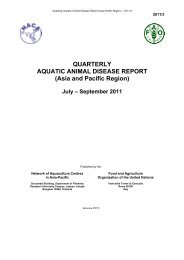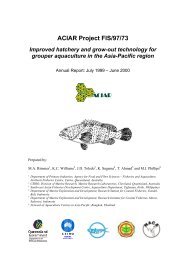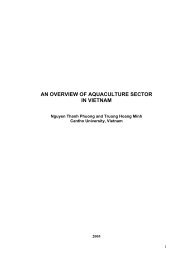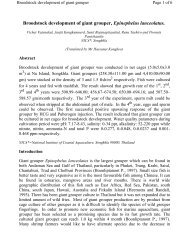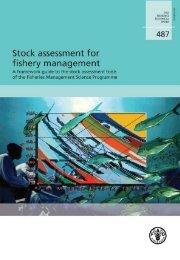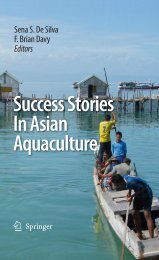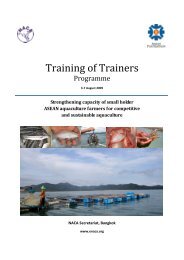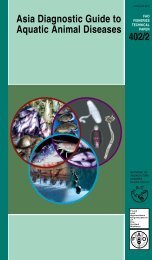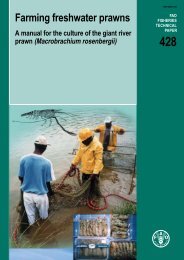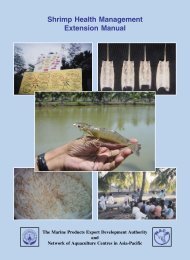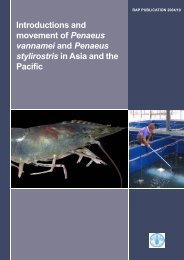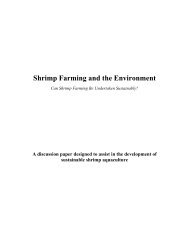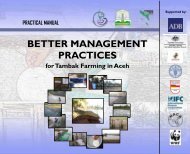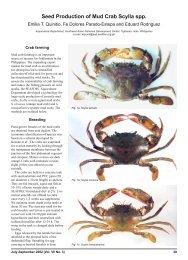State of World Fisheries and Aquaculture 2004 - Library
State of World Fisheries and Aquaculture 2004 - Library
State of World Fisheries and Aquaculture 2004 - Library
Create successful ePaper yourself
Turn your PDF publications into a flip-book with our unique Google optimized e-Paper software.
Selected issues facing fishers <strong>and</strong> aquaculturists<br />
75<br />
The oldest labour instrument in fishing is the Hours <strong>of</strong> Work (Fishing)<br />
Recommendation, adopted in 1920, just one year after the founding <strong>of</strong> the ILO. 34<br />
The existing ILO fishing labour st<strong>and</strong>ards that apply to persons working on board<br />
fishing vessels are the Conventions on minimum age, medical examination, articles <strong>of</strong><br />
agreement, accommodation <strong>and</strong> competency certificates, <strong>and</strong> the Recommendations<br />
on vocational training <strong>and</strong> hours <strong>of</strong> work. Two <strong>of</strong> the existing labour st<strong>and</strong>ards<br />
– competency certificates <strong>and</strong> accommodation <strong>of</strong> crews – also explicitly exclude smallscale<br />
fishing vessels from their scope. In practical terms, the scope <strong>of</strong> the existing labour<br />
st<strong>and</strong>ards in fishing, in general, does not include people who work on artisanal <strong>and</strong><br />
small-scale fishing vessels. New issues that are not covered by existing instruments<br />
include identity documents, repatriation, recruitment, medical care at sea, occupational<br />
safety <strong>and</strong> health, social security protection, <strong>and</strong> compliance <strong>and</strong> enforcement.<br />
Although it is almost 40 years since the last ILO fishing labour st<strong>and</strong>ard was<br />
adopted, the ratification levels <strong>of</strong> these Conventions have been very low. Moreover,<br />
these instruments are no longer fully relevant <strong>and</strong> need to be updated to reflect<br />
the changing nature <strong>of</strong> fishing operations in today’s world. The ILO is therefore in<br />
the process <strong>of</strong> revising them in order to update <strong>and</strong> strengthen the Organization’s<br />
st<strong>and</strong>ard-setting system to reflect the changes in the sector.<br />
POSSIBLE SOLUTIONS<br />
In March 2002, the 283rd Session <strong>of</strong> the Governing Body <strong>of</strong> the ILO decided to place<br />
on the agenda <strong>of</strong> the session <strong>of</strong> the forthcoming International Labour Conference<br />
an item concerning a comprehensive st<strong>and</strong>ard – a Convention supplemented by a<br />
Recommendation – on work in the fishing sector. The new st<strong>and</strong>ard was to revise the<br />
seven existing ILO instruments. Issues hitherto not addressed in relation to people<br />
working on board fishing vessels would be taken up, namely, occupational safety <strong>and</strong><br />
health, <strong>and</strong> social security.<br />
The ILO also intends to provide protection for people working on both large <strong>and</strong><br />
small fishing vessels in all its fishing labour st<strong>and</strong>ards. The Organization believes that<br />
the objectives <strong>of</strong> the new instruments should be to extend coverage to reach as many<br />
people working on board fishing vessels as possible; minimize obstacles to ratification;<br />
achieve a more widespread ratification; enable the provisions to be implemented in<br />
practice <strong>and</strong> minimize the risk <strong>of</strong> the Convention becoming outdated in a short period<br />
<strong>of</strong> time.<br />
The new comprehensive st<strong>and</strong>ard on work in the fishing sector would take into<br />
account the provisions <strong>of</strong> the 1995 FAO Code <strong>of</strong> Conduct for Responsible <strong>Fisheries</strong><br />
<strong>and</strong> would try to integrate the work <strong>of</strong> the ILO with that <strong>of</strong> other international<br />
organizations concerned with fisheries <strong>and</strong> the operation <strong>of</strong> fishing vessels. This, the<br />
ILO believes, would result in the st<strong>and</strong>ard being clearly understood <strong>and</strong> found more<br />
acceptable by the ministries responsible for labour issues as well as those responsible<br />
for fisheries management <strong>and</strong> vessel safety, <strong>and</strong> by fishing vessel owners <strong>and</strong><br />
individuals who work on fishing vessels.<br />
RECENT ACTIONS<br />
A Committee on the Fishing Sector was set up by the 92nd Session <strong>of</strong> the International<br />
Labour Conference, held in Geneva in June <strong>2004</strong>, to adopt provisions on a number <strong>of</strong><br />
substantive issues related to fishing labour st<strong>and</strong>ards. The Conclusions adopted by the<br />
Committee, after 20 sittings, aim to reach the majority <strong>of</strong> the world’s fishers, including<br />
those on board small fishing vessels. This coverage will provide protection also to the<br />
self-employed, especially those who are paid in a share <strong>of</strong> the catch.<br />
The Conclusions also provide sufficient flexibility to ensure wide ratification <strong>and</strong><br />
implementation. Such flexibility is particularly important in view <strong>of</strong> the complex nature<br />
34<br />
The texts <strong>of</strong> all ILO Recommendations <strong>and</strong> Conventions are available on the ILO Web site at http://www.ilo.org.



